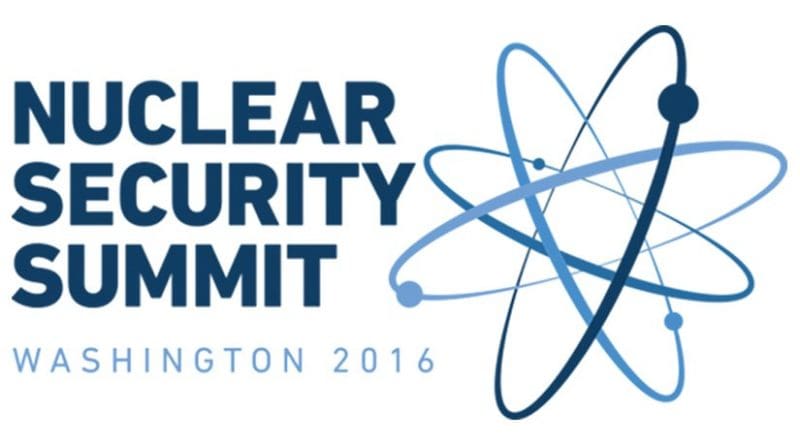Future Of Nuclear Security Post-Obama: Report On Final Nuclear Security Summit – OpEd
By Daniela Zordova*
Approaching the end of his presidential term, Barack Obama convened leaders from over 50 countries for the final Nuclear Security Summit. The March 31-April 1 Washington gathering marks the end of a high-level diplomatic process with roots stretching back to the 2009 Obama´s Prague Summit speech. In light of contemporary narratives of terrorists´ willingness to hijack unguarded nuclear materials, or target nuclear sites, a wide participation of all vital players became a sine qua non of securing vulnerable substances. The absence of representatives from Russia and Iran casts doubts on the undertaking´s future success.
As a part of his 2009 Prague speech, President Obama articulated his concerns regarding nuclear proliferation and insufficient security of hitherto acquired materials. His address initiated a series of summits aimed at safeguarding existing nuclear supply, including the minimisation of the use of highly enriched uranium (HEU), participation in international organisations, and prevention and detection of illegal trafficking of materials indispensable for the weapon-creation. Recent stagnation and lack of improvement coupled with the 2016 non-participation of key actors in the endeavour not only highlight the flawed architecture of the process, but also contributed to the loss of momentum and might render the previous achievements futile.
Together administering the vast majority of the total global stock, involvement of Russia is an essence for any significant political breakthrough to be achieved. Its absence has been officially blamed on “shortage of mutual cooperation on agenda”; even though the rationale seems to lie in Russia’s desire to demonstrate the deadlock inevitably resulting from the failure to recognize the country´s rejuvenated position in the world.
Regardless of the genuine reason for Russia’s decision to boycott the summit, it will undoubtedly have repercussions capable of stalling, if not outright undermining the progress. Recent comeback of Russia to the leaders’ club and the use of other than hard-power instruments to manipulate system for own benefit manifests the position the country has asserted, as much as its ability to influence and steer the course of events. Similar empty chair crises had in the past served to teach a lesson of no bright prospects of advancement without the absentee. While the U.S. administration speaks of the missed opportunity for Russia and slipping further into isolation, Obama must be well aware that chances for considerable change in nuclear security domain wane as his term slowly draws to the close, and Russia´s assistance would have enhanced future outlooks.
As Obama declared preceding the gathering, “…we’ll remain vigilant to ensure that Iran fulfils its commitments.” Not inviting Iran to the summit puts the fervor of commitment to the test. If threatening sanctions should have represented a punishment for avoidance of diplomatic solution, welcoming Iran among the participants should have provided a reward for compliance with agreed conditions. Once Iran´s nuclear program meets international requirements, suspicion could have been tamed and the country should have legitimately joined other players at the table.
Even if the time is not ripe yet for a fully-fledged and active involvement of the country in global undertaking, the symbolic value of extending an invitation to Tehran could have helped to bridge the gap. Provided the end of the series of summits and an uncertain future of the endeavour under the upcoming U.S. administration, the opportunity for reconciliation with Iran could be lost forever. Hypotheses aside, Iran might be a toddler in nuclear legitimacy talks and under the risk of deviation resulting from constant international rebuff, neglect or dismissal. However, the country’s geopolitical position renders Iran eligible for admission to the community.
Absente reo, North Korea featured high on the list of priority topics. Parties to the summit consented to the need to peacefully deal with the Pyongyang threat. Despite undeniably exaggerated claims about the severity of Korean threat, solutions touching sensitive spots and negotiated by others in the absence of the one to be impacted, have never worked out well. Besides major flaws in the summit´s participation logic, the eve of the summit saw naming, shaming and blaming. In response to fears of Pakistan’s potential shift to smaller and tactical weapons, in an attempt to defend its arsenal, country´s representation pointed to the size of India’s nuclear program and related episodes. Alas, progress in the world-wide safeguarding of materials requires a joint commitment and a sense of a shared cause. Incidents entailing mutual accusation only further undermine the spirit of the project.
However, at least Czech delegation arrived back home in complacency. Recognized and acknowledged for its complete removal of HEU from the territory, Prime Minister Sobotka readily offered assistance and support to other countries struggling with elimination. As he stressed, ”the Republic has voluntarily committed to a further 12 specific activities to strengthen nuclear security.“
Several issues loom large following the end of nuclear security summitry. Apart from the major flaws represented by non-participation or exclusion of crucial players and the hypocritical nature of the effort in light of the U.S. investment in arsenal modernisation, the success and future of the undertaking are both at risk. With Obama´s term concluding soon, it remains to be seen whether the new administration takes on the legacy of Obama’s flagship initiative.
About the author:
Daniela Zordová – A double degree student at the Metropolitan University Prague & University of Trento, aspiring for the MA in International Relations and European Studies. Coming from Slovakia and currently oscillating between Prague and Trento, her research interests gravitate around small states & SIDS, sustainable development potential and geopolitical explanations of foreign policy behaviour. Since 2013 occupying a PR position in the Central European Journal for International & Security Studies and publishing under the same banner. She is still secretly feeding the potential PhD scenario that so far resists all attempts at eradication. You can follow her on Twitter at @DanielaZordova.
Source:
This article was published by Bombs and Dollars

